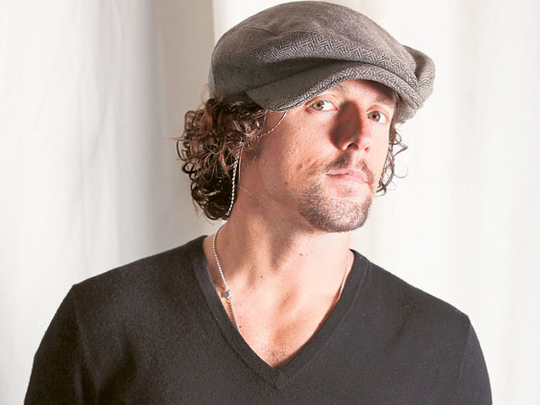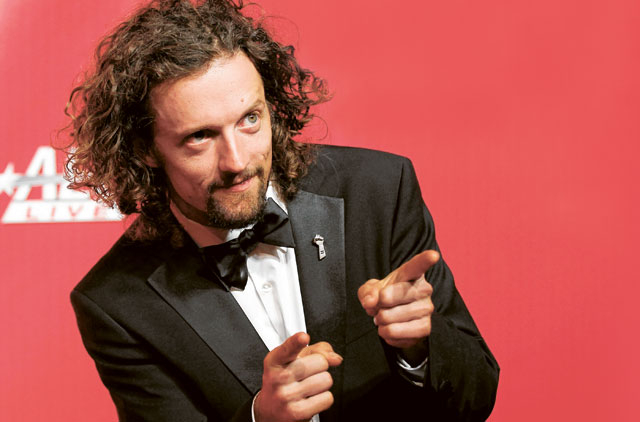
Jason Mraz is a man not easily influenced, yet so easily influenced all at the same time.
Unlike seemingly the rest of the world, his life isn't controlled by Facebook. The guitar-playing singer-songwriter sums up Twitter as little more than "bathroom-wall graffiti".
"I feel like I'm a one-way tweeter," said Mraz, so obviously uninspired by even the mention of the social network. "I feel like I'm defacing the bathroom wall. I walk into the Twitter lounge, write my quote, post my comment, tell my joke, and walk back out again. So I'm not really following other twitters."
Mraz, along with a couple of lost tribes in the Amazon, I think to myself, must be the only person without a Facebook account.
"I use it as a way of connecting to a minor 10 million fans," he added, sarcastically referring to the Jason Mraz fan page. Some of those 10 million will be in the audience when he makes his Dubai debut at the 10th Skywards Dubai International Jazz Festival on February 23.
"I try to keep it raw. Try to keep it real," he says of his use of social media. "In the beginning I was following a lot of the news channels — BBC, CNN — and then I quickly became very overwhelmed by all the news coming into my life and it kinda bummed me out. So I just stopped one day."
Yet while he may not conform to the usual social stereotypes we'd all expect from a rags-to-riches teenage musician, his openness to expand his world — the old-fashioned way — is what catapulted him to where he is today.
Having started playing his guitar relatively late in life (aged 18), it was one of those serendipitous meetings which changed things for him.
During a period of experimentation in New York City - a "ridiculous move" according to his Virginia-based family — Mraz was inspired by a psychic in Central Park.
According to Mraz, the lesson offered was "to avoid the questioner and go with what you know". Following this new rule as well as his instincts to sing, he eventually made his way to San Diego to start dreaming the way he does today.
He's a man who hasn't allowed fame to change who he is or what he believes. He still dreams and allows others to do the same, especially when it comes to his music.
"I always try to try feel good songs," he said. "And The World As I See It [from his upcoming album, Love Is A Four-Letter Word] is an opportunity to view the world that you see as a place that you love. To recognise that you are a part of everything. That you are a part of the air and the water. You are a part of everyone and we all have our bad days and we all have gravity in our lives to deal with."
Having always had a vision to see how songs could be interpreted if left only to the listener to decide, Mraz says he writes most of his songs as if he's lost in a dream.
"I try to remind people with my music that life, and the world especially, isn't coming at you, it's coming from you. The World As I See It is a way to re-envision the world as a place that's remarkable but each in our own way."
Going platinum
Mraz got started having finally received attention from Elektra Records, which released his debut album Waiting For My Rocket To Come in 2002. Hit singles The Remedy (I Won't Wait), You & I Both and Curbside Prophet all contributed to the album going platinum.
The second release was Grammy-nominated Mr A-Z in 2005, followed by We Sing. We Dance. We Steal Things, with the single I'm Yours, which garnered three Grammy nominations, including Song of the Year .
Awards aside Mraz says it's all about the performance and luckily for us is "pumped" about playing in Dubai.
"I'm giving hugs and high fives to everyone out there already," he said. "I think I've worked with quite a few of the artists at the jazz fest this year and that's always great. That's the thing about jazz festivals, which are great. People are usually happy to jam with other people. You have great musicians and artists coming together and making new music and new history. It's all about the music."
Mraz has shared venues with Bob Dylan, Paula Cole, Jewel and David Gray to name a few and while he's enjoying what fame brings he was quick to pay his fortune forward.
When I spoke to Mraz, I raise the topic of charity on the sunshine coast of California, albeit there was a distinct lack of warmth from Mraz. Until now. There was a welcome change in Mraz's voice. We may be chatting on the phone but I can tell with every word the edges of his mouth are pointing north — he's smiling.
"It's an opportunity for me to take this popularity and income I've been given over this last couple of years and to start shining it on all the good causes out there. Sharing it with others," he said. "It makes me feel really good man. I continue to champion about 10 of my favourite humanitarian causes. Whether it's human exploitation and trafficking or environmental preservation."
Mraz explains the bigger plan is to eventually put all his attention into one charity but says right now "I'm helping lots of people until I find my way".
When Mraz doesn't want to talk about something his voice becomes slow, slurred, like a steam train running out of fuel. It's a chore to speak. Maybe he's bored, I considered, suddenly feeling the pressure for better lines of questioning.
"Mechanicsville — it's a typical small American town," was his reply to tell us about where he grew up. Gulp. "White picket fences, lots of churches, a lot of good schools, good public school system. In the last 10 years it's grown significantly. It's a lot like every American town now which has been run over by huge commercial chains."
‘Live in the future'
But to my surprise he continued to speak — at length — about the reasons his sleepy American town got its name. I heard settlements, Civil War, blacksmiths, mechanics, a place to get things fixed. But my mind wandered as I tried desperately to figure this one out.
And Mraz read my mind. "I can send you my bio. I tell it best," he said. "I just prefer to live in the future." I was amazed when he actually did. This is what follows.
"As biographies go, I should tell you about where and how I was raised in Mechanicsville, Virginia. I should tell you how I manifested my creative wild side, while my parents were busy divorcing, working, and remarrying. I should explain the kinds of pop music I listened to, whether it was on the oldies stations or the same explosive jam stations that presented star-studded skate nights in my rural community rinks. It would be wise to mention a minor stint in musical theatre before picking up the guitar in those Big Apple college years, as well as discuss what eventually brought my C average up to an A when I found a voice to follow which eventually carried my heart and soul to the salty streets of San Diego. It's a good story really, but it's been told time and time again and I'm about tired of answering questions about the mischievous psychic in Central Park. It turns out he was really just a homeless guy asking for a dollar and I accidentally shook his hand and began an eternal trip down hallucination lane. Since then it seems I haven't been able to come down from the cosmic absurdity that surrounds my song and chance. What's most important to this bio is the understanding that at the end of the day, despite my whereabouts and disposition, I always did it my way."












